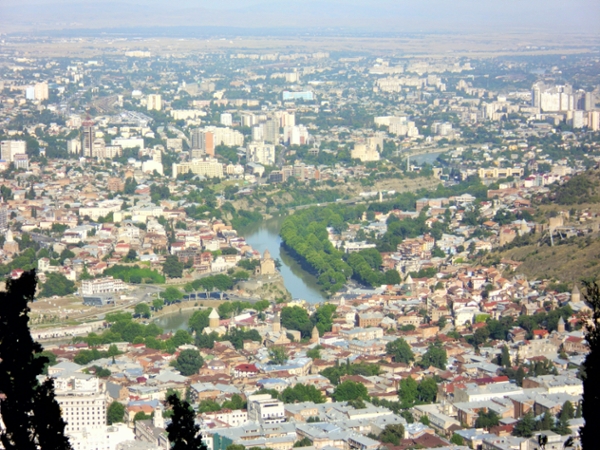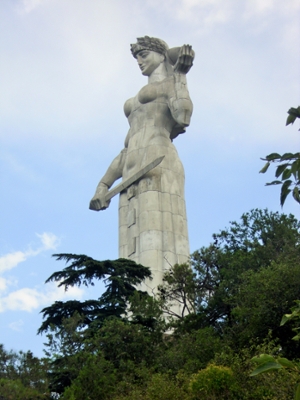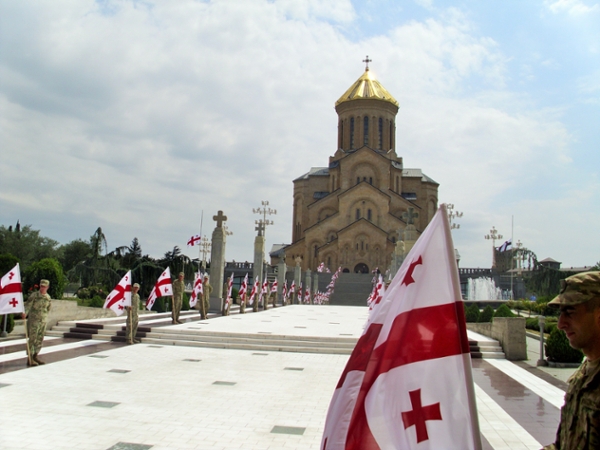Train Trip to Tbilisi!
My trip to Tbilisi far exceeded my expectations. The capital of Georgia is a fairly large city nestled in the mountains, watched over by the protective Mother of Georgia statue at the top. I took the train to Tbilisi from Baku, which was an interesting experience in itself. I was pleasantly surprised at the clean sheets and decently comfortable bed mats on the train (actually, they were almost more comfortable than my bed in my Baku apartment, which has metal springs sticking up all over inside it).
There was a young (maybe twenty-somethings) Ukranian girl in my compartment, and she was telling us (I went with my Azeri friend, and they spoke in Russian, and he translated for me) about the current, awful situation in Ukraine. She told us that random local trains between Ukrainian towns were being stopped, and the men were given weapons, forced to get off, and had to go fight. She also described how you could smell the dead bodies there. It made the crisis seem so much more real to me—when you see things on the news, it doesn’t seem quite so scary.
After arriving in Tbilisi, we went to the top of the funicular (a two-car train going up the mountain), where there was a park, and the absolute best restaurant view I have ever seen—not to mention delicious, traditional Georgian food. The view from the restaurant is below (we ate on a balcony).
The Marionette Theater was next on my must-see list, and tickets were surprisingly cheap (I booked them early, online, and paid the equivalent of about $15 for two front-row seat tickets!). The show was incredibly unique. The puppet figures looked like old, Soviet dolls, and many of the characters had the red stars on them. You could see the people moving the dolls, with solemn faces and deliberate motions. The story was a tragedy, played in Georgian, with English subtitles coming from a screen above the stage (although you could tell some of the subplots became a bit muddied in translation). One part of the show included a criminal trial of the main bird character, Boris, where he was convicted for stealing money to help his old, suffering, widowed owner and sentenced to life in the window of a pet shop for his crime.
The next day, I took a gondola (enclosed ski lift) up to the top of the mountain to see the Narikala fortress, Mother of Georgia, and a church. There were great views of both the city and the mountains. I also got to see the priest ring the church bells on the fortress wall—what a beautiful sound. The botanical garden was on the other side of the mountain, at the bottom of a ton of stairs. There was a waterfall, bamboo, and many other beautiful trees and flowers. The Mother of Georgia is in the photo below.
Abanotubani, the place most known for its mineral baths, was my next stop. I heard some warnings about the hygiene, so I didn’t try any of the baths, but they were still neat to see. There were shops, cafes, and live music in the same area. My first wine tasting in Georgia was at a little shop nearby. Further back past the baths was a gorge leading to another waterfall. It was so beautiful to see at night under a full moon. As I was leaving the waterfall, huge fireworks went off in the sky over the baths. The feeling I had watching them was indescribable.
I visited the Tsminda Sameba Church on Sunday, where I had quite a unique experience. As the taxi drove us to the church, I noticed a lot of police standing around on the streets, and I thought it was a little odd. We arrived at the gate of the church, and there were more police and official-looking men. Surprisingly, we were allowed to pass through the gate, but there were fences blocking the main staircase leading to the church. After walking around the gardens and seeing military personnel dressed in camouflage, carrying Georgian flags, we knew something had to be going on. I put on my headscarf (Orthodox Christians require head coverings to enter their churches), and we were allowed to enter the church. The churches in Georgia all smelled so wonderful from the burning incense and candles. There were many people inside the church, and a coffin with a Georgian flag on it. Some priests were singing, and one was swinging incense back and forth. After walking around the church and the other church buildings in the courtyard and gardens, we returned to the entrance gate, where soldiers holding flags were lined up along the main pathway and stairs to the church. I later found out that it was the funeral of Shevardnadze, the former Georgian president—and we even saw the procession on tv as we passed by a restaurant a few hours later in Old Tbilisi.


